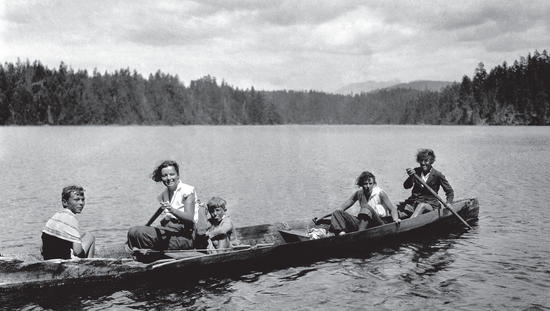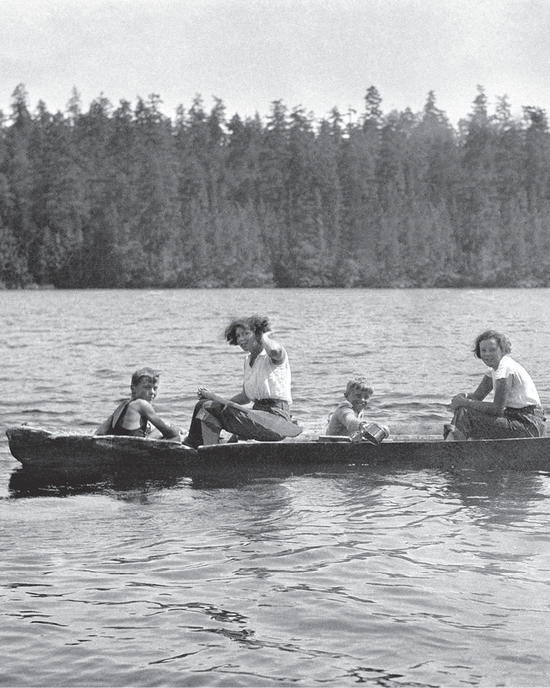Lakes
Sometimes during the long summers we would get a longing to soak the salt out of ourselves. Charts are concerned only with the sea—they are not interested in what lies beyond the shores. They mark all the mountains for a mile inland—the highest ones with the altitude noted. But they are all aids to navigation. At the bottom of some charts they even have pictures of how the mountains rear and fold at the entrance to various sounds. Navigators approaching strange shores, and confronted with a solid line of mountains, know from the pictures that if they approach a mountain of a certain altitude, with other mountains that fold in a certain way on to either side—then a certain sound or harbour will open out as they approach closer.
But it has evidently never occurred to the cartographer that a small navigator might like to know of a small lake where he could soak the salt out. Archibald Menzies, the botanist who accompanied Captain Vancouver on the first trip up this coast, often made special notes of the waterfalls they came across. I expect they did use them for filling up the water casks as well. But I always have a mental picture of Captain Vancouver, Archibald Menzies, the botanist, and the other young gentlemen standing under the waterfalls—soaking out the salt.
After all, Vancouver’s ships were on the coast for four months in 1792. They took shelter and anchored at night in the same coves as we did. They did most of their exploring in their small boats. Except for trying to make friends with the Indians, many of whom had not seen white men before, they lived the same kind of life that we did, and were concerned with the same kind of problems. So it is natural to suppose that they, too, liked to get the salt out at times.
Waterfalls are all right in their way, but they are usually cold. The lakes that over the years we have marked on our charts in red are warm. To qualify for the red mark there must also be a safe place to leave the boat. The lakes are often some distance inland, and you can’t soak properly if you are worrying about your boat. It was sometimes fishermen, but usually loggers, who told us about these lakes. They would mark on the chart the bay in which to look for the stream—if we couldn’t find or use the old skid-road.
“Just walk up the bed of the stream and you’ll come to the lake. We were in there ten or fifteen years ago—logging,” they would say.
Once, following directions like that, we were lucky to find the stream. If we hadn’t noticed it coming out through the rocks at low tide it would have been impossible to find. There was an almost impenetrable fringe of alders, maples and salmon berries above the beach—which we worried and tore at. When we finally broke through, we were in a mysterious low tunnel of green growth—all clutching to hold us back. The little stream eddied and gurgled on its way to the sea.
It was twilight in there, and what with getting scratched with branches and slipping off the rocks, we one by one came to the conclusion that fifteen years was a long time to remember just which bay. At this rate we would never find the lake. Then, suddenly, it was lighter ahead, and the sun came through in shafts, making irregular, shimmering patches on the stream. At last we struggled and broke through onto the shore of the little hidden lake.

I don’t know how long that little unnamed lake was—two miles at least, and perhaps half a mile wide. It was set down in the centre of pale-green growth—alders and maples that had rapidly covered the scars the loggers had left. And above the new growth more high, dark-green hills, fold on fold. Halfway down the lake a very disturbed loon was calling and calling . . . I don’t suppose anyone had been in here since the loggers had left, and probably its mother had told it that man never came here.

We swam and we soaked, then lay in the sun, thoroughly fagged out for the moment. Fresh water is enervating compared with salt water, and much harder to swim in. The youngsters found some little turtles sunning themselves on a log. When the whispering began, I knew that they were planning to keep them in the boat for the rest of the summer. How awful to have to face up to a thing like that, feeling as limp as I did! Then, fortunately, John’s turtle bit his finger. When I heard him say sternly to it, “You are very rude, you can go right back to your mother,” I knew that the problem was partially solved. But I would certainly have to keep an eye on Peter, or a turtle would turn up in the boat later.
Peter and John went exploring along the deer-trail on the edge of the lake. The two little naked boys suddenly began dancing up and down on the shore. “We found a dugout, we found a dugout!” Jan ran over to investigate. More shouts, and I ran too. It was long and very old, but it floated. It didn’t take us long with our knives to fashion paddles out of this and that. Then, lunch-pail tucked in the bow, we paddled down the lake towards a low rocky point about a mile away. The dugout leaked quite a bit, and finally Peter and John had to take turns bailing with the lunch-pail. The loon was having hysterics now. Probably its wife and nest were hidden in the reeds that filled a little bay. The water was smooth as a looking-glass, and our reflection followed along under us as though we were hinged together. I would have liked to linger on that lake, but the water in the dugout was gaining on us, and it seemed expedient, as Captain Vancouver would have said, to make the shore.
There were signs that deer had been browsing in behind the rocky point, where maples overhung the cropped green grass. They would lie there in the shade on a hot afternoon, and their spotted babies would be hidden in the bracken beyond. How can a mother deer stand the constant alert for prowling bears or cougars? A doe’s ears are always turning this way and that, tuning in on the slightest sound—smelling the wind for a betraying scent. I seldom had to tune in for anything worse than a turtle that might bite.
We turned the dugout over to dry while we ate our lunch on the shelving rock. We tried to caulk the crack with pine-needles and pitch. It was a long, long crack, but half a crack is better than a whole crack. Paddling back with the bits of this and that was harder than before—but bailing was reduced by half.
It was an effort in that limp state to have to squeeze through the pale-green tunnel again . . . Then the children cornered a ten-inch trout by damming up its escape route. The trout never had a chance against three pairs of hands. I got tired of waiting while they planned further strategy. Telling them that I would light a fire on the beach, and bring the supper things ashore, I pushed ahead, and finally broke through to the beach, head first.
I lighted a fire and piled it up with bark—estimating that in an hour’s time there would be a glowing bed of embers, just right for broiling trout.
It was the sound of their voices that woke me up. All smiling broadly . . . they actually had caught three more.
“That little one is John’s,” Peter announced, “because he can’t eat as much.”
“I can so—I’m just starved.”
“Well, Jan and Peter have to clean them,” I said, and took him out to the boat with me to prevent murder.
We always carried a rack for broiling fish. Soon they were spluttering and browning over a perfect fire, which I raked over between two flat stones. We built it up with more driftwood, which is always piled high at the top of the beaches on the British Columbia coast.
No one had any desire to fool around that evening. John fell asleep before it was even dark. The Northern Lights were edging this way . . . and that way . . . across the northern sky—reaching up above us—white and elusive, then retreating hurriedly down to the horizon.
It wasn’t until Jan suddenly said, “Mummy, where’s the dinghy?” that my spirit returned to its limp body.
I didn’t actually have to swim—but very nearly. Somebody had committed the sin of sins—not tied it properly. I didn’t ask. I didn’t probe too deeply within myself—evidently a certain amount of salt is better than too little.
